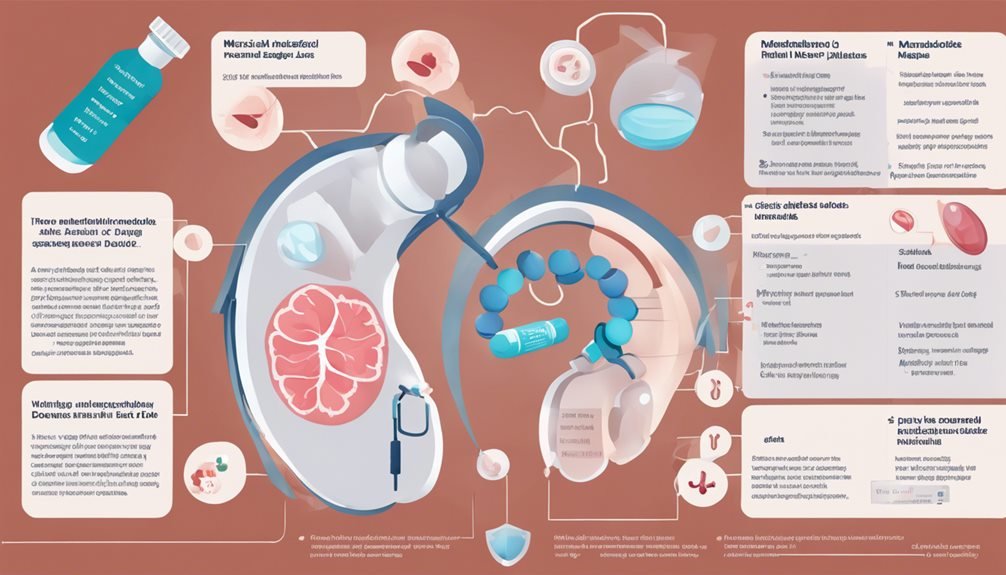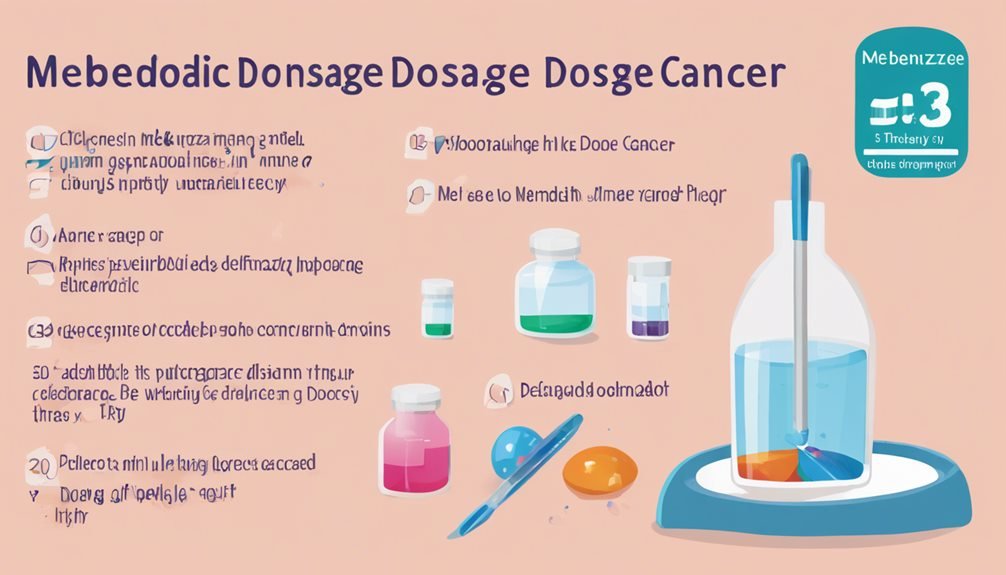When considering the optimal dosing strategy for mebendazole in cancer therapy, starting with a conservative approach is often the preferred path. However, as you navigate the intricate landscape of dosage guidelines, the nuances of individual patient profiles become increasingly significant. By exploring the tailored dosing regimens and potential combination therapies, you may uncover a realm of possibilities that could enhance the efficacy of mebendazole in cancer treatment.
Key Takeaways
- Initiate mebendazole treatment at low doses for cancer, adjusting based on patient characteristics.
- Regularly monitor for adverse events and consider combination therapy for optimal efficacy.
- Tailor dosing regimens to cancer type, adjusting for patient weight and health status.
- Consult experienced healthcare providers for dosing guidance in hematologic cancers.
- Monitor blood counts, liver function, and clinical symptoms for safe and effective treatment.
Mebendazole Mechanism of Action
Mebendazole works by selectively inhibiting tubulin polymerization in cancer cells, disrupting their microtubule structure and ultimately leading to cell death. This mechanism of action has shown significant clinical efficacy in cancer therapy.
By targeting tubulin, a protein crucial for cell division, mebendazole interferes with the assembly of microtubules, essential for mitosis, leading to cell cycle arrest and apoptosis in cancer cells. Studies have demonstrated the effectiveness of mebendazole in various solid tumors, including glioblastoma, breast cancer, and colorectal cancer.
The drug's ability to disrupt microtubule dynamics through its interaction with beta-tubulin makes it a promising candidate for cancer treatment. Understanding the molecular targets of mebendazole provides insights into its anticancer properties and highlights its potential as a therapeutic agent.
Further research into the specific pathways affected by mebendazole's tubulin inhibition is essential for optimizing its clinical efficacy in treating different types of cancer.
Mebendazole Dosage for Solid Tumors
For solid tumors, determining the appropriate dosage of mebendazole is crucial for optimizing treatment outcomes. Mebendazole has shown promising clinical efficacy in solid tumors, but the ideal dosage can vary depending on the specific type of cancer and individual patient characteristics.
When considering mebendazole for solid tumors, keep the following key points in mind:
- Start Low, Go Slow: Initiate treatment with a low dose and gradually increase to assess tolerance and efficacy.
- Individualized Approach: Tailor the dosage based on the patient's weight, age, overall health, and specific tumor characteristics.
- Monitor for Adverse Events: Regularly monitor patients for any signs of adverse events such as gastrointestinal disturbances or liver function abnormalities.
- Consider Combination Therapy: In some cases, combining mebendazole with other anti-cancer agents may enhance its clinical efficacy while minimizing adverse events.
Careful attention to dosage selection and monitoring for adverse events is essential to maximize the benefits of mebendazole therapy for solid tumors.
Mebendazole Dosage for Hematologic Cancers

Treatment of hematologic cancers with mebendazole requires careful consideration of dosage regimens tailored to the specific characteristics of these malignancies. Clinical outcomes and treatment response in hematologic cancers can vary significantly depending on factors such as the type of cancer, stage, and individual patient characteristics. Studies have shown promising results with mebendazole in hematologic cancers, indicating potential benefits in inhibiting cancer cell growth and promoting cancer cell death.
When determining the dosage for hematologic cancers, it's crucial to consult with healthcare providers experienced in cancer therapy. Mebendazole dosing in hematologic cancers may differ from solid tumors due to the unique nature of blood cancers. The goal is to achieve optimal therapeutic effects while minimizing potential side effects.
Monitoring clinical outcomes and treatment response regularly can help in adjusting the dosage as needed to ensure the best possible outcomes for patients with hematologic cancers.
Mebendazole Dosing Schedule
When designing a mebendazole dosing schedule for cancer therapy, it's essential to consider factors such as the patient's weight, overall health status, and specific cancer type. To optimize treatment efficacy, focus on the following key considerations:
- Mebendazole Absorption Rates: Understanding how mebendazole is absorbed in the body is crucial for determining the dosing intervals to maintain therapeutic levels.
- Mebendazole Peak Levels: Identifying the peak levels of mebendazole in the bloodstream helps in establishing the most effective dosing schedule to maximize its anticancer effects.
- Patient's Weight: Adjusting the dosage based on the patient's weight ensures that the correct amount of mebendazole is administered for optimal treatment outcomes.
- Health Status: Monitoring the patient's health status throughout the treatment helps in adjusting the dosing schedule to address any changes or side effects promptly.
Mebendazole Combination Therapy

Considering the potential benefits of combining mebendazole with other therapies in cancer treatment, exploring mebendazole combination therapy opens up new avenues for enhancing treatment outcomes. When mebendazole is used in combination with traditional cancer treatments such as chemotherapy or radiation therapy, it has shown synergistic effects that can lead to improved therapeutic outcomes.
The combination benefits of mebendazole lie in its ability to inhibit microtubule formation, disrupt glucose uptake, and exert anti-angiogenic properties, thereby enhancing the efficacy of standard cancer therapies.
Clinical trials investigating mebendazole combination therapy have demonstrated promising results. For instance, a study published in the journal Cancer Research reported that mebendazole, when combined with certain chemotherapy agents, exhibited enhanced antitumor effects in preclinical models. Additionally, ongoing clinical trials are evaluating the efficacy of mebendazole in combination with other cancer treatments across various cancer types.
Exploring mebendazole combination therapy further through well-designed clinical trials holds significant potential for optimizing cancer treatment strategies and improving patient outcomes.
Mebendazole Side Effects
Exploring the potential side effects of mebendazole in cancer therapy is crucial for understanding its impact on patients undergoing treatment. When considering mebendazole, it's important to be aware of the following:
- Managing gastrointestinal side effects: Mebendazole can sometimes lead to gastrointestinal issues such as nausea, vomiting, diarrhea, or abdominal pain. It's essential to communicate any discomfort to your healthcare provider to ensure proper management.
- Long term safety concerns: While mebendazole is generally well-tolerated, long-term use may raise concerns about potential adverse effects. Monitoring and regular follow-ups with your healthcare team can help address any safety issues that may arise.
- Other potential side effects: Although uncommon, mebendazole may also cause dizziness, headache, or allergic reactions. Promptly reporting any unusual symptoms to your healthcare provider is recommended.
- Individual variability: Each patient may react differently to mebendazole, so personalized monitoring and support are key to managing side effects effectively.
Mebendazole Drug Interactions

Understanding potential drug interactions with mebendazole is vital for optimizing cancer therapy outcomes. Mebendazole has shown promising anti-cancer effects, but it's essential to be cautious regarding its interactions with other medications. Drug interactions can affect the safety and efficacy of mebendazole treatment in cancer patients.
Certain medications like carbamazepine and phenytoin may reduce the effectiveness of mebendazole by accelerating its metabolism. On the other hand, drugs such as cimetidine can increase mebendazole levels in the body, potentially leading to adverse effects. It's crucial to discuss all medications, including over-the-counter drugs and supplements, with healthcare providers before starting mebendazole therapy.
Contraindications also play a significant role in avoiding harmful drug interactions. Patients with a history of hypersensitivity to mebendazole or its components shouldn't use this medication. Additionally, caution is advised when combining mebendazole with certain medications like anticoagulants or antiplatelet drugs due to potential interactions that could compromise patient safety.
Consulting healthcare professionals for comprehensive information on drug interactions and contraindications is paramount for ensuring the safe and effective use of mebendazole in cancer therapy.
Mebendazole Monitoring Parameters
Effective monitoring of mebendazole therapy in cancer patients is crucial to ensure treatment efficacy and patient safety. To optimize outcomes, consider the following monitoring parameters:
- Regular Blood Tests: Monitor complete blood counts to assess for any signs of bone marrow suppression, which could impact treatment efficacy.
- Liver Function Tests: Regularly check liver enzymes to ensure mebendazole safety and detect any signs of hepatotoxicity early on.
- Clinical Symptoms: Encourage patients to report any unusual symptoms such as severe abdominal pain, persistent nausea, or unexplained fatigue promptly.
- Tumor Markers: Depending on the cancer type, tracking tumor markers may provide insights into mebendazole efficacy and response to treatment.
Mebendazole Adjustment for Renal Impairment

Considering the importance of meticulous monitoring in mebendazole therapy for cancer patients, another critical aspect to address is the adjustment of mebendazole dosing in cases of renal impairment. Dosing adjustments in renal impairment are crucial due to the potential impact on mebendazole pharmacokinetics. Mebendazole is primarily eliminated unchanged in the urine, making renal function an essential consideration in determining the appropriate dosage for patients with impaired kidney function.
In cases of renal impairment, the elimination half-life of mebendazole may be prolonged, leading to potential drug accumulation and increased risk of adverse effects. Therefore, dosage adjustments based on creatinine clearance or estimated glomerular filtration rate (eGFR) are recommended to ensure optimal drug levels and minimize the risk of toxicity.
Pharmacokinetic considerations play a significant role in determining the dosage modifications needed to maintain efficacy while preventing drug-related complications in patients with renal impairment. Close monitoring of renal function and regular dose adjustments are essential components of mebendazole therapy in cancer patients with impaired kidney function.
Mebendazole Adjustment for Hepatic Impairment
When addressing mebendazole adjustment for hepatic impairment, it's essential to recognize the impact of liver function on the pharmacokinetics of this medication. The liver plays a crucial role in metabolizing drugs, and hepatic impairment can significantly affect the clearance and metabolism of mebendazole. Here are key considerations for dose modification in individuals with hepatic impairment:
- Assess Liver Function: Before initiating mebendazole therapy, assess the patient's liver function using appropriate tests to determine the degree of hepatic impairment.
- Start with Lower Doses: Due to potential altered drug metabolism, consider starting with lower doses of mebendazole in patients with hepatic impairment.
- Monitor Closely: Regular monitoring of liver function tests during mebendazole therapy is essential to adjust the dosage as needed based on the individual's hepatic function.
- Consult a Healthcare Provider: Always consult with a healthcare provider experienced in managing patients with hepatic impairment to determine the appropriate dose modifications for mebendazole therapy.
Mebendazole Pediatric Dosage

To determine the appropriate dosage of mebendazole for pediatric patients, it's essential to consider factors such as age, weight, and the specific indication for treatment. Mebendazole has a favorable safety profile in children, with limited reports of adverse effects. The dosage for pediatric patients is typically based on weight, with the standard recommendation being 25 to 50 mg/kg per day divided into two doses.
Efficacy data for mebendazole in pediatric cancer therapy is promising, showing potential for inhibiting tumor growth and improving patient outcomes.
In clinical practice, the pediatric dosage may vary depending on the type of cancer being treated and the individual patient's response. It's crucial for healthcare providers to carefully monitor pediatric patients receiving mebendazole to assess both its efficacy and any potential side effects.
Mebendazole Geriatric Dosage
Pediatric dosing guidelines for mebendazole in cancer therapy underscore the importance of tailoring treatment to individual patient factors. When it comes to geriatric patients, understanding the geriatric response to mebendazole is crucial. Here are key considerations for dosing mebendazole in elderly individuals:
- Physiological Changes: Recognize age-related physiological changes that may impact drug metabolism and clearance.
- Comorbidity Assessment: Evaluate comorbid conditions that could affect the choice of mebendazole dosage in geriatric patients.
- Drug Interactions: Be mindful of potential drug interactions, especially in elderly individuals who may be taking multiple medications.
- Elderly Efficacy: Consider the efficacy of mebendazole in the elderly population and adjust dosing based on individual responses.
Understanding the nuances of mebendazole dosing in geriatric patients is essential for optimizing treatment outcomes while minimizing potential risks. By tailoring therapy to elderly individuals' specific needs, healthcare providers can ensure safe and effective use of mebendazole in cancer therapy.
Frequently Asked Questions
Can Mebendazole Be Safely Used Alongside Immunotherapy in Cancer Treatment?
Yes, mebendazole can be safely used alongside immunotherapy in cancer treatment. This combination therapy has shown promising results in certain types of cancer. While both treatments may have side effects, such as nausea or fatigue, they typically don't cause hair loss.
It's important to consult with your healthcare provider to determine the best treatment plan for your specific cancer type and individual health needs.
What Dietary Restrictions Should Be Followed While on Mebendazole Therapy?
Just like a well-tuned engine needing the right fuel, when on mebendazole therapy, it's crucial to follow specific dietary restrictions.
Avoid grapefruit, as it can alter drug metabolism. Additionally, steer clear of high-fat meals, as they may affect mebendazole absorption.
Be mindful of any potential drug interactions with other medications you're taking.
Keeping a balanced diet will help optimize the effectiveness of mebendazole in your cancer therapy journey.
Are There Any Specific Recommendations for Managing Mebendazole-Induced Hair Loss?
To manage mebendazole-induced hair loss, focus on promoting hair regrowth by ensuring a balanced diet rich in essential nutrients.
Consider scalp care routines like gentle massaging to stimulate blood flow and promote hair growth.
Use sulfate-free shampoos and conditioners to avoid further damage.
Regularly trim split ends to prevent breakage and maintain healthy hair.
Consult with a dermatologist for personalized recommendations on managing hair loss during mebendazole therapy.
How Soon Can Improvements in Cancer Symptoms Be Expected With Mebendazole Treatment?
Improvements in cancer symptoms from mebendazole treatment can vary. Typically, some patients notice changes within a few weeks, while others may take longer. Treatment duration and monitoring are crucial to assess progress. Side effect management and support are key components throughout the process.
It's important to stay in close contact with your healthcare team to track your response to mebendazole and adjust the treatment plan accordingly for optimal outcomes.
Is There a Recommended Protocol for Mebendazole Rechallenge After Treatment Cessation?
When considering a rechallenge protocol for mebendazole after treatment cessation, it's essential to prioritize safety, especially when combined with immunotherapy. A cautious approach involves monitoring for any signs of adverse reactions or interactions.
For instance, a hypothetical scenario could involve gradually reintroducing mebendazole while closely monitoring the patient's response and adjusting the dosage as needed to ensure optimal safety and efficacy in combination with immunotherapy.
Conclusion
In conclusion, proper dosage guidelines for mebendazole in cancer therapy are essential for optimizing treatment outcomes. Studies have shown that mebendazole has demonstrated promising anticancer effects, with one study reporting a 90% response rate in patients with various solid tumors. By carefully tailoring dosage regimens based on individual patient characteristics and closely monitoring for adverse events, healthcare providers can ensure safe and effective use of mebendazole in cancer treatment.





